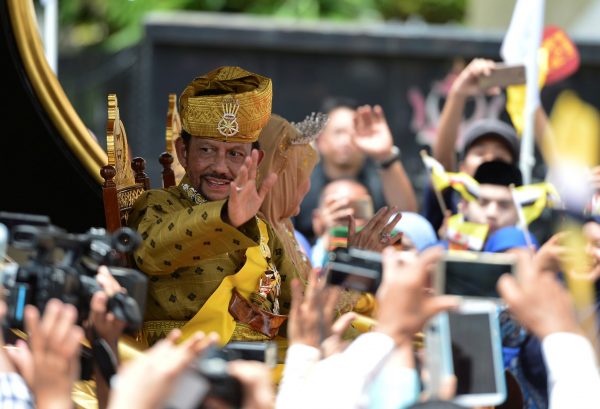The perceived thread to economic growth and stability went hand in hand with an increased focus on Islam in Brunei. Still, it is very important to note that Islam has always played a pivotal role in the political landscape of Brunei.
In recent years Brunei has received international attention due to attempts to tighten and expand Syariah criminal law. The Syariah Penal Code Order 2013 (SPCO 2013) mostly consolidated already existing Islamic criminal offences. It brought together crimes under other Islamic and civil codes and filled in regulatory gaps. Significant changes included the application of certain provisions to non-Muslims — something that has interestingly not drawn significant attention so far — and highly controversial punishments for certain crimes. This includes amputation for robbery and stoning for adultery, usually characterised as hudud law.
Immediate implementation was not possible nor sought by the government. Instead the ‘new’ criminal law was supposed to be implemented in stages. The most important missing piece was a criminal procedure code. This came in the form of the Syariah Courts Criminal Procedure Code Order 2018 (SCCPCO 2018), passed in March 2018 and enforced since early 2019. Like the SPCO 2013, the SCCPCO 2018 drew arguably ineffective international criticism based on international human rights law — Brunei is after all one of Asia’s most reluctant ratifiers of human rights law.
As a ‘concession’ to this international criticism, the Sultan expanded the existing moratorium on the death penalty to capital offences under the SPCO 2013. As argued elsewhere, this can easily be abolished — certain actions are still considered criminal and punishable, even if not by death for the time being.
The Islamisation of law is hardly criticised within Brunei, unlike in neighbouring Malaysia. This is because of three unique elements resulting in an arguable lack of internal discourse. The first, the monopoly on the official discourse of Islam, results in the second, a monolithic understanding of Islam. All of this is further cemented by the general lack of a critical civil society.
Islam is one of the key cornerstones of the state and moreover of the absolute monarch who derives his authority and legitimacy from Islam. Brunei is an absolute Islamic monarchy similar to Saudi Arabia, meaning the Sultan’s rule is all encompassing and includes law (including executive, legislative and arguably judicial authority), politics and religion. Those three aspects are inseparable in the ‘Personaleinheit’ of the Sultan. The indivisibility is reflected and formally enshrined in the state ideology of Melayu Islam Beraja (‘Malay Muslim Monarchy’), which explicitly equates sovereignty and political legitimacy with the Sultanate, Islam and Malay identity.
This monopoly is further protected through legislative measures. For instance, the SPCO 2013 makes it a criminal offence to neglect, exhibit contempt, contravene, oppose or criticise a titah (royal speech) or decree of the Sultan with up to five years imprisonment. If the offender neglects, exhibits contempt, contravenes, opposes or criticises a member of the Brunei Islamic Religious Council (Majlis Ugama Islam Brunei), the punishment is a maximum fine of BR$2000 (US$1470) and/or up to six months imprisonment. This provision is applicable for both Muslims and non-Muslims. Issuing a fatwa (a religious ruling or opinion) or teaching Islam without proper state authorisation will also result in fines of BR$8000 (US$5870) and/or up to two years imprisonment.
The criminalisation of diverting from the officially sanctioned interpretation of Islam makes it difficult to express political or religious dissent in Brunei.
Adding to the closed political conditions is the fact that Brunei has been in a constant state of emergency since 1969. Brunei ranked 152 in the 2019 World Press Freedom Index. According to the 2016 Brunei Human Rights Report, there is no registered civil society group directly advocating for human rights. Advocacy is mostly conducted by international or external groups, like the Brunei Project. It is no surprise that criticism is usually anonymous and very cautious. The alternative is to leave the country, a move that is apparently considered especially within the LGBTQ community in light of the sanctions imposed under Islamic criminal law.
While international criticism of Brunei’s interpretation and implementation of Islamic law continues, a national discourse is yet to emerge. Given the Sultan’s political and religious status, challenging his authority amounts to challenging the state itself. So far Bruneians have not made any attempts to take this step. Brunei has been politically stable since the unsuccessful pre-independence revolt in 1962, which resulted in the still ongoing state of emergency.
Kerstin Steiner is Associate Professor and Director (International) at the La Trobe Law School, La Trobe University, Melbourne. She is also Senior Associate of the Centre for Indonesian Law, Islam and Society (CILIS) and Associate of the Asian Law Centre (ALC), the University of Melbourne.

